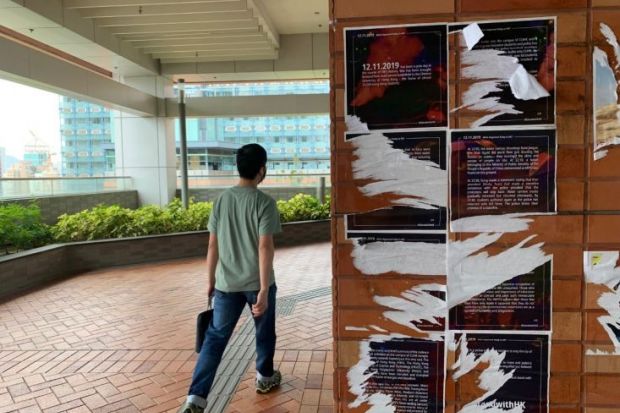The elevated walkway that connects the old and new campuses of the century-old University of Hong Kong (HKU) is normally the centre of student life, lined with lecture announcements, concert posters and political petitions.
Soon after China imposed a new national security law on the city last month, protest-related materials were ripped off, in a scene repeated at campuses across the city. And yet a week later, some were back, including one that said: “Stick your own posters instead of tearing ours down. University is a place for free speech.”
The poster war is just one manifestation of the heightened fears that have overtaken Hong Kong in a matter of weeks, as academics and students worry if the special administrative region will come under mainland Chinese-style regulations.
Hundreds of people have been arrested, social media accounts have been shut, and protest phrases have been banned. Scholars based overseas have expressed trepidation about travelling to Hong Kong, because the law could criminalise speech by anyone, anywhere in the world.
At a meeting of HKU Convocation, an organisation representing graduates and lecturers, Simon Young, associate dean (research) in HKU’s law school, pinpointed the section about collusion and asked if it would apply to fundraising, “not just from governments, but organisations and people. It’s very broad. Grants and research funding – is that going to stop?”
He also said that the section about “state secrets” was “a worrying area”. Affected materials may “not just be text. It could be data, technology, [or] technology transfer.”
Joseph Chan of HKU’s department of politics and public administration said bluntly that “I worry I may unintentionally break the law. But I also have non-legal worries, about pressures that may come from many corners of society.”
He gave a potential scenario: in a politics course, could a teacher ask a student to look at the pros and cons of secession issues? If a student felt the question was politically incorrect, could he “turn in” the professor?
There have been previous cases of mainland Chinese professors being punished after students “informed” on them for critical comments.
Academics said that even university leaders may not be able to guarantee the security of their staff. King-wa Fu of HKU’s Journalism and Media Studies Centre said he “didn’t think anyone could address this concern. The result is that teachers and students will self-censor, which defeats the whole purpose of research and teaching.”
Jeh Tsz-lam, the HKU student union president, said that “we are in a critical time, full of uncertainty”, and questioned if student associations could be held liable, for example, for simply managing a poster wall.
“Academic exchange is not possible without an exchange of ideas,” Ms Jeh said. “We believe this university is the last bastion of freedom of expression.”
On 9 July, the student union issued a letter to vice-chancellor Xiang Zhang, saying that if HKU “does not embrace different opinions and the pursuit of universal values, it will be relegated to an oppressive tool of the Chinese regime and even a mere clown in the eyes of international society and other higher institutions.”
The fuzzy line between Hong Kong and mainland China was evident when HKU’s law school held a talk that was supposed to include two Beijing law scholars: Han Dayuan of Renmin University of China and Wang Zhenmin of Tsinghua University.
Professor Han took a balanced approach, saying that consensus was needed on the law’s implementation. However, when he said “human rights” in English, in an otherwise Chinese-language speech, his Zoom connection cut, because of what the moderator said were “technical difficulties”. Professor Wang was not able to appear at all.
Register to continue
Why register?
- Registration is free and only takes a moment
- Once registered, you can read 3 articles a month
- Sign up for our newsletter
Subscribe
Or subscribe for unlimited access to:
- Unlimited access to news, views, insights & reviews
- Digital editions
- Digital access to THE’s university and college rankings analysis
Already registered or a current subscriber? Login










